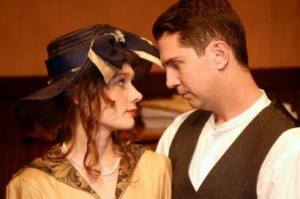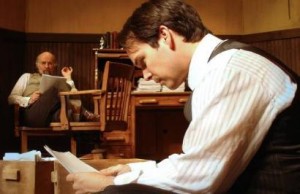
Richard Greenberg’s The Violet Hour seems throughout Act 1 (at least
superficially) to be a light and semi-absurd (albeit very intelligent) comedy.
However with the blackout line which concludes the act, it transforms itself in
Act 2 into a far more provocative (and intellectually stimulating) drama. The
two acts together form a funny and thought-provoking evening of theater.
It is April 1, 1919, and John Pace Seavering, having just “hung out his shingle in
the publishing game,” must make an major decision: whether to publish a
manuscript written by his best friend Denny or one written by his secret lover,
Negro entertainer Jessie Brewster. (Only one of them can be selected, for
economic reasons.) Denny’s novel The Violet Hour, “about 25 books” long,
comes in at around “2 million pages.” Jessie’s manuscript is considerably
shorter; she has written her memoirs.
Assisting John in his endeavors is the fussy and often exasperated Gidger, who
complains that “I am your employee in a business which does not exist.” When
John replies that he holds Gidger in the highest esteem, the latter queries, “Is
Gidger my first name or my last?” Given that John does not know the answer,
it is no wonder that Gidger is exasperated.
When Denny arrives, John informs him that he is going to the theater that
evening, upon which Denny declares his distaste for contemporary drama.
“Why pay attention when you know how the play is going to end?”
(Significant words, as we in the audience will soon discover.) Denny has just
lost his job for having “said some things,” making it more important than ever
that John publish his manuscript. “After reading my book, people won’t need
to read anymore,” Denny enthuses.
Next to arrive is the Josephine Bakeresque Jessie, whom Gidger refers to as the
“tawny nightingale” (or “raven-skinned songstress” among other sobriquets),
famed for her unique way of ululating when she sings. John is clearly taken with
the furtive nature of their relationship since “everything in my life has been so
safe, I’ve been longing for something clandestine.” When it comes to
publishing Jessie’s manuscript, though, John still vacillates, infuriating the
chanteuse. “It’s all right for you to f— a n—– but you don’t want to be a n—–
press,” she accuses.
Completing The Violet Hour’s quintet of characters is the beautiful, forward
(for the era) meatpacking heiress Rosamund Plinth, who is Denny’s fiancée.
When John informs Rosamund that he is only “considering” publishing Denny’s
book, she flies into a rage. If Denny’s manuscript remains unpublished,
Rosamund will be forced to marry her father’s choice of husbands for her.
“Everything is riding on this,” she informs John. “Denny and I are the only
happiness that is possible for each other.” If there’s no book, there’ll be no
blessing, and poor disinherited Rosamund will be very poor indeed.
In the midst of all this, a machine has been delivered to the offstage outer
office, a machine which starts spewing out hundreds of pages of the printed
word, the contents of which will not be revealed here so as not to spoil the
surprises ahead in Act 2. Suffice it to say that as Gidger’s agitation increases,
so does his frustration with John’s total disinterest in the machine’s bizarre
behavior. “Doesn’t anyone care that something phenomenological is
happening in the very next room?!?” screams Gidger to no avail.
There is much that could be revealed here about The Violet Hour’s second
act, but the less the audience knows about “the machine” and what it’s up
to, the better. For those whose curiosity is insatiable, the following paragraph
will provide a few hints. Those wishing to be completely surprised may skip to
the next.
Gidger asks, “What’s World War I? Why I?” and later, “What’s happened to the
word ‘gay’?” John tells Gidger, “Look at us. We’re period. These aren’t
clothes we’re wearing. They’re costumes.” Gidger declares, “Whatever will be
will be” and begins humming “Que Sera Sera.” Later, from outside the office,
he cries out, “Oh my God! I am never again going to eat red meat!”
One of the pleasures of Greenberg’s script is the intelligence of his humor. Take
this exchange, for example, discussing Rosamund’s unique (and according to
Denny “great”) laugh.
–Her laughter is tiered.
–As in lachrymose?
–As in layered.
–Oh … tiered.
In many ways, The Violet Hour is a work which defies description. At one point,
I jotted down, “Bizarre! I don’t know quite what to make of this.” It’s quite
possibly a play requiring a second viewing in order to be fully appreciated.
Fortunately, a number of sensational performances (and the overall quality of
the production) make this an appealing proposition.
As John, Thomas Burr (a young John Ritter) underplays superbly to Kyle
Colerider-Krugh’s deliciously over-the-top Gidger, one of the most colorful
performances of the year. In the role of Rosamund, lovely Elizabeth O’Brick
captures the look and the sound of an educated woman of another century.
Jeff Kerr McGivney does fine work as the desperate Denny, and shines
particularly in a poignant Act 2 monolog. Finally, and possibly best of all, is
Angelle Brooks as Jessie, whose sudden rage in the second Act 2 is
devastating, and brilliantly performed.
Stuart Rogers, who won the Best Director Ovation for last season’s The Long
Christmas Ride Home (which unfortunately, due to the illness of a cast
member, I missed and could not reschedule), confirms with this production
that he is a talent to be reckoned with. Douglas Lowry’s office set has the look
of a century ago as do Susanne Klein’s costumes, and Thadeus Frazier-Reed
has done a fine sound design. Luke Moyer’s lighting captures the sepia toned
quality of a bygone era, and turns gradually violet (as in the play’s title) for one
of the evening’s more affecting scenes, an emotional conversation between
Denny and Rosamund, interrupted by a sudden arrival at which the lights
return abruptly to their amber brightness. A most effective lighting design
indeed.
With this L.A. premiere, Theatre Tribe proves itself once again one of L.A.’s finest
(and classiest) troupes. Theatergoers in search of stimulating, thought-
provoking entertainment will find much to enjoy, and talk about, in The Violet
Hour.
Theatre Tribe, 5267 Lankershim Blvd., North Hollywood.
www.theatretribe.com
–Steven Stanley
March 14, 2008
Photos: Sara Shapely




 Since 2007, Steven Stanley's StageSceneLA.com has spotlighted the best in Southern California theater via reviews, interviews, and its annual StageSceneLA Scenies.
Since 2007, Steven Stanley's StageSceneLA.com has spotlighted the best in Southern California theater via reviews, interviews, and its annual StageSceneLA Scenies.







 COPYRIGHT 2024 STEVEN STANLEY :: DESIGN BY
COPYRIGHT 2024 STEVEN STANLEY :: DESIGN BY